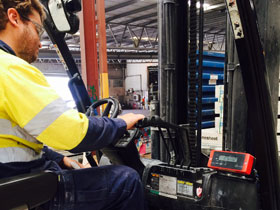 Bill Ambrose |
Bill is currently the AccuWeigh regional general manager of South and Western Australia. He has been in the weighing industry for over 15 years, and has been with Accuweigh for more than 11 years.
Both laws require the verification of weights, with serious consequences in the event of a transgression.
The new Chain of Responsibility legislation recognises that multiple parties may be responsible for offences committed by the drivers and operators of heavy vehicles and legal liability applies to all parties along the supply chain. For example, if a heavy vehicle driver breaches mass, dimension or loading requirements, legal liability could rest with the employer, the company directors, the consignors/consignees/receivers of the goods, those who loaded or unloaded the goods or even the person who managed the premises where the loading or unloading took place. The ramifications are far-reaching.
 Regulations make weight measurement count |
And under the SOLAS regulations which came into effect from July 2016, if the gross mass of a container is not verified before being loaded onto a ship, the terminal operator is not allowed to proceed with loading. The container has to be weighed using calibrated and certified equipment before it's loaded, either in its entirety or by adding up all the verified weights of all the individual packages and packing materials in the container plus the tare weight of the container itself.
In both instances, these changes in weighing legislation have implications for forklift fleet operators. There can be no room for error. Equipment has to be calibrated and certified and, in order to ensure compliance, accurate and consistent measurements are crucial.
Forklift scales will need to be tested regularlyFleet operators will have to make sure that the forklift scales on their vehicles are tested on a regular basis to ensure they meet the regulatory standards. The process is fairly complex and the testing and calibration has to be done by the National Measurement Institute (NMI) or a company that is officially licensed by the NMI.
When it comes to the SOLAS requirements, regardless of whether the forklift is a large capacity one capable of weighing a loaded sea container as a whole or a smaller capacity one for weighing all the component parts of the loaded container, the scales have to pass stringent NMI testing before they can be used to determine the certified gross weight of a container. Standard testing for scales isn't sufficient - only verified test masses to NMI standards are acceptable.
Responsibility of forklift fleet operators for complianceIn terms of the CoR legislation, forklift fleet operators are part of the supply chain and can be held liable for any breaches of the law. They need to make sure that all their drivers are doing their business safely and within the legal parameters.
Data from forklift scales will need to be properly documentedAnother implication of the new legislation is that forklift fleet operators will have to ensure that shipment data is captured and documented properly. This may mean making changes to their existing forklift scales to ensure that the weighing equipment that is installed on the forklifts is capable of real-time data collection as well as efficient and accurate inventory and billing management in order to meet legislative requirements.
It's clearly advisable for forklift fleet operators to partner with equipment suppliers who understand all the legal implications and who stay abreast of any legislative changes in order to provide customers with the most appropriate advice and information. It's also helpful to partner with a supplier that is NMI-accredited, such as AccuWeigh.